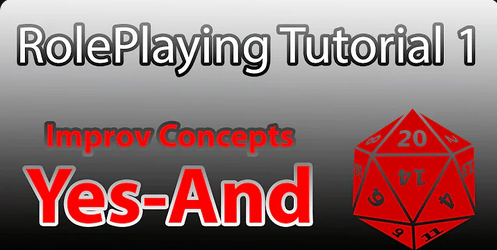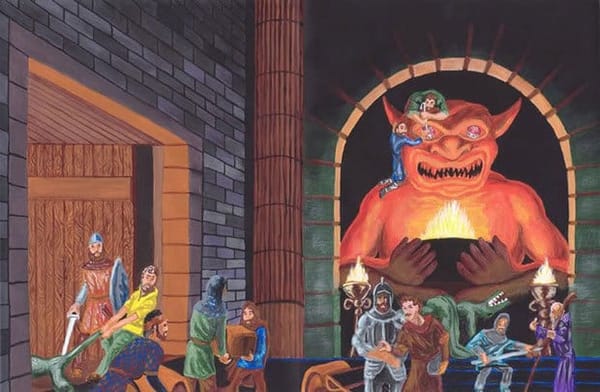Why I'm Breaking Up With Running Pathfinder (For Now)

I thought about a million rom com/dating tropes to start this blog with. I even thought about opening up with a "It's not you, it's me" joke. But sometimes simple is just better (a philosophy that the developers at Paizo have never once considered).
How did we even get here though? My path to Paizo games (and ultimately to the OSR/NSR scenes) started with some serious table troubles and redefined how I thought about RPGs, prep, and what I want out of a game.
It all starts in the year 2019, ironically the year that Pathfinder 2nd Edition released, although the game was not even a twinkle in our eye at that point. One of my absolute best friends was running a Final Fantasy themed RPG for us, at the time a group of 8 (7 players and 1 GM). There were...to call them "issues" is maybe underselling the problems we were having as a table. Things were actually getting quite heated and people were saying some pretty mean things to each other, without going too deep into the specifics. What I saw was a pretty clean split in the group; there were people at the table who were far more interested in the roleplay/narrative aspects of play, and there were people there who were far more interested in the crunchy/tactical aspects of play. Also, the group was way too fucking big to manage properly. So I stepped in and proposed the great schism; we would split the group into two groups of 4 people each, each group would go recruit another person, and maybe we wouldn't be at each others' throats all the time (this didn't end up being the case for other, systemic reasons). The narrative folks fucked off and started a Vampire: The Masquerade game. And I became the shepherd of the tactical/crunchy players.
Now, this was already a problem although I didn't realize it at the time. I actually like...well a little bit of everything in my games. What can I say, variety is the spice of life! I also did not have the spoons to run a game at that point in my life, or at least not create one from scratch. So my criteria were pretty simple; the game needed to be relatively crunchy, it had to have decent published adventures I could run, and I needed a break from the Fantasy genre.
Enter, Starfinder

Starfinder basically fit what we needed at the time to a tee, and so our game kicked off, using the Dead Suns Adventure Path. Starfinder itself is a pretty fun game, although it carries a lot of baggage from 1st edition Pathfinder/D&D 3.5E. It's a little jank, a little "ivory tower", and also the spaceship combat rules really suck.
The pandemic moved the game online, we started on Roll20, eventually found out about Foundry and switched things over there. Things went crazy, members changed, and we eventually decided to end the Starfinder game and switch to Paizo's other baby.
Path, found (or was it?)

Pathfinder 2E was the newer, younger model. It had that streamlined 3 action economy, excellent support in Foundry which had quickly become our VTT of choice, and it didn't have terribly tedious spaceship combat in it. My friend took over running and we made our way through the entire Extinction Curse Adventure Path while I also dabbled with running and got us halfway through Agents of Edgewatch before fizzling out on what was not a very good module series.
Pathfinder, to its credit, does a lot of things very well and is probably the ideal modern fantasy RPG in a lot of ways. It has a ton of options for players, tightly designed rules that mostly just work, and Paizo keeps pumping out content at an ungodly pace for it so there's always something new to look at. In particular contrast to 5E's somewhat loose rules, lack of quality supplements, and poor official adventure quality, it was a no brainer. Plus Paizo is a union shop and isn't sending the god damn Pinkertons to harass people.
Unfortunately for my (only recently diagnosed) ADHD brain, I had picked up a set of books during the pandemic that would be an eye opening revelation in how RPG books can be laid out; I had impulse bought the Old School Essentials Advanced Fantasy Player's and Referee's tomes, as well as the official adventures The Incandescent Grotto and The Hole in the Oak. And boy were they eye opening.
Built Different in the OSR
Up until this point, I had pretty much only played or read games that were the products of major publishers. WotC, Paizo, Catalyst, Evil Hat Games, etc. were the companies I was familiar with in the space. I had loosely heard of the OSR through some friends, particularly games in the Black Hack lineage. It wasn't that Old School Essentials was some masterful home of elegant design; it is after all just a restatement of some ancient D&D rules. It was the fact that the game was so masterfully organized and easy to reference that fundamentally altered my brain chemistry.
You see if you're a GM who has ever tried to run official adventures for your game of choice, you have probably figured out pretty quickly that what is supposed to be a time saver for you is actually somehow more work in some respects. Sure I don't need to invent the hooks, characters, challenges, etc. by myself. But I do have to read some pretty dense text cover to cover, sometimes multiple times to really grasp what is happening and what bounds I'm playing in. And to quote Wrestling's greatest piece of shit; "That don't work for me, brother".
It had seemed to me, that despite GMs being the primary consumer and purchaser of books for their tables, that GMs were treated as second class citizens by most of the major publishers. Your average Paizo Adventure Path book is 100 pages, and there's typically 6 such books to comprise an entire campaign. That's a lot of reading for a busy adult with a job and a life to parse through just to run a weekly game!

But these dungeons I had picked up with OSE? Holy crap! They were digestible, they were condensed, I could easily bring one of these to the table with minimal prep and run by the seat of my pants. They weren't just the kind of game books I wanted, they were the game books I needed if I was going to be running good premade content. And it turned out there was an entire scene dedicated to making and running games like this.
What Came Next?
As I scrambled to irresponsibly buy every interesting PDF and book I could find, scoured Discord and Reddit for more info on the scene, popular blog posts to read, etc, I also became increasingly dissatisfied with my Pathfinder games. Eventually, some real life shit would lead to both of my games (one as a player and one as a GM) to be on permanent hiatus (AKA they are dead dead).
Now that I've had some time away from them, I think I'm better able to articulate my stance here, particularly as a GM, with Pathfinder and why I'm not keen to step into the drivers seat any time soon. Doesn't mean I wouldn't play again (I'll play in pretty much any game system) and doesn't mean my tastes won't change, but this is where I'm at right now.
Problem 1: The Remaster
For those of you not in the know on Pathfinder news, let me catch you up. When the OGL scandal was happening, Paizo was panicking; after all their entire business model couldn't exist without the OGL. Despite the eventual resolution that led to the OGL remaining unchanged and the 5E SRD being put into the Creative Commons, leadership at Paizo felt like they needed to divest from the OGL. This led to the formation of the ORC license, and the Pathfinder 2E Remaster.
The Remaster is dual purpose. On one hand, it's intended to get rid of any language and words tied to the OGL. On the other hand it aimed to try and touch up some outstanding balance concerns or tweak classes where possible.
I'm not going to mince words with how I feel about this; the Remaster fucking sucks. It has arbitrarily changed every word and term you might have been familiar with. No more Flat-Footed, no more Magic Missile, no more Bag of Holding. All of them have been replaced with new words, new terms that every player needs to learn instead of the lingua franca of 20+ years of D&D design. It's hugely confusing, especially if you are playing any legacy content.
Not only that but some pretty serious changes were made to the mechanics; alignment got removed, Drow were just outright deleted, spell damage formulas were re-worked, etc. It's not a small list of changes and it made a game that was already big and complex even more confusing to understand, let alone onboard people. And speaking of onboarding people...
Problem 2: The Release Schedule
Paizo, generously, has one of the most batshit insane business models out there. They put out an egregious amount of content on a regular basis; new adventures, new splat books, entirely new classes to the game! When we started playing Pathfinder, there were 16 classes in the game, which was already a fair amount to manage. Since then, Paizo has added 9 more to the game, and has released playtest info for at least another 4 on the way. I have had to help onboard people new to Pathfinder since then and let me tell you; it's gotten really fucking hard.
There comes a point where your game simply has too much stuff in it; I don't want to feel like I have to "keep up" with an RPG. I also don't want that RPG releasing things that invalidate my already purchased books!
Having cool new stuff to check out for your game is neat, but it also makes me question what kind of testing and quality assurance is going into these products. I've run into several instances in the official Adventure Paths that make me question my sanity; who could have possibly okayed this!? Fucked up encounter design and dungeon difficulty, unreasonable expectations on the default path the players might take, random tacked on sub-systems where the party manages a circus? Who thinks these things are good?
Problem 3: The Playstyle
I could probably engineer my way around problems 1 and 2 and be satisfied. But what I'm not satisfied with are the kind of games Pathfinder is explicitly designed to run; linear games focused on a lot of tactical combat.
As a forever GM, I want to be treated like a player too! I want to be surprised by what the party does, I want my players to have maximum agency in what they get to do, and I don't want to necessarily hold their hand or hold back when things get tough for them.
What Pathfinder is set up for, is for the GM to spend a lot of time building carefully curated, mathematically challenging (but not overly deadly) encounters, and then having the party go through them on their way to the finish line. And it has fantastic encounter building and math for this, the numbers just work and it's fairly easy to design encounters that do what they say they do. It also means that it doesn't support improvisational play very well; if players go off script they can easily just die to a challenge they aren't ready for yet, which feels unfair in a game with incredibly bounded math. That's not to say I couldn't run a sandbox game using Pathfinder, and I know people who have; but it's a lot more work than using a system that is purpose built for that kind of play.
Will my tastes change over time? Sure maybe, tastes are always changing. But I don't think I'm going to change my mind on wanting great GM content and maximum player agency in my games. I want easy to run games where my players have ample opportunity to surprise and delight me with their choices, and Pathfinder just isn't that game.





